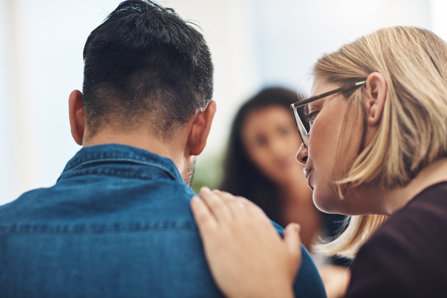My Loved One Overdosed... Now What?!

Overdose, it’s a scary word that nobody likes to consider happening to someone they love. For the millions of people living with addiction themselves or who love someone with an addiction, it is a constant and legitimate fear, especially when so many people are overdosing on drugs across the country. Far too many people die from a drug overdose. But for the lucky ones who make it, what are the next steps their family members should be taking to ensure it doesn’t happen again?
While there is no 100% guarantee that a loved one will not pick up drugs again after taking these steps, it is always best to be proactive in these situations. Narcan and detox may be effective short-term solutions to deal with the immediate issues, but they are not long-term solutions to a severe problem. An overdose is always a serious event, and when left untreated, it is usually never a one-time occurrence.
So what are some practical steps a family can take when their loved one overdoses? Continue reading to find out.
Address the immediate problem.
First, if you find a loved one has overdosed, it is always a good idea to call 911 right away for emergency medical help. Even if you have the opioid reversal drug Narcan on hand and can administer it, you should still call for medical assistance. Any overdose is a life-threatening problem that needs to be addressed by trained medical professionals. So even if you can revive your loved one, they will still need to be checked out by a doctor.
Don’t have any Narcan on hand? If you have a loved one struggling with opioid addiction, it would be a wise idea to have Narcan in the house. Many states will offer this life-saving medication at local pharmacies without a prescription. Ensure that you speak with a trained medical professional about how and when to administer Narcan before you need to use it. It is best to have this done ahead of time; preparation is always better than regret.

Address the underlying issues.
Merely going to the emergency room will not be enough to address the underlying issues that led to the overdose in the first place. Too often family members think that the overdose will be enough to “scare the person straight” so that they never use drugs again. While there are certainly cases where this has been true, this is not a common occurrence. That is because addiction is a powerful thing that can cause people to make irrational decisions. To do everything possible to prevent another overdose from occurring in the future, the person with the addiction will need to address their addiction.
Seek professional help.
There is no shame in asking for professional help, especially when it comes to something as serious as addiction. After a loved one has gone to the hospital, it would be wise to start looking for a long-term treatment program to address the addiction. Short-term detox programs are not very effective in helping a person achieve long-term sobriety. If you truly want your loved one to get a good handle on their addiction, then a long-term program is the best way to go. Do not be fooled into thinking that a short stay at the hospital will be enough to fix the problem.
Be prepared to confront your loved one about their addiction. Nobody enjoys having to call someone out on their destructive behavior. While this will most likely be an unpleasant conversation to have, it will be well worth your efforts. It is better to confront a loved one about their addiction and run the risk of having them be upset with you than not to say anything and run the risk of having them overdose again. It is essential to do this in a way that is as loving and empathetic as possible. Remember that your loved one has been through a lot, especially if they just overdosed. While this will be an already tense time for them, it will be the perfect chance for you to see if they will be willing to accept the help they need to get better. For many people, a near-death experience is enough of a wake-up call to shows that a significant lifestyle change is necessary.

You may need to do an intervention.
Doing an intervention is something that can be extremely uncomfortable for anyone involved but has the potential to save your loved one’s life. If you are unsure where to start or how to put an intervention together, I recommend calling an addiction professional for help. Many places will help walk you through how to do it yourself or can put you in contact with an experienced interventionist who can help you do the intervention.
Line up treatment as soon as possible.
If you can set up treatment for your loved one’s addiction, get them into a program as soon as possible. An ideal scenario would be to have the person go straight to rehab immediately after being discharged from the hospital. No matter what they tell you, it is not a good idea for them to see their friends or get one last fix before going to rehab. Too many people have died from getting their “last fix.” The best thing you can do is get them to go to treatment right away.
Be prepared for them to change their mind.
Often a person will overdose, accept help for their addiction and then change their mind once they get into rehab. Second thoughts often occur when a person begins to sober up, and they start to experience the mental and physical effects of withdrawal. Cravings are a completely normal thing for an addict to experience when trying to get sober. Early recovery difficulties are why it is beneficial to be in a residential treatment center during the early stages of sobriety. Your loved one may try calling you to say that they are doing better and don’t need to stay the length of their program to stay sober. It is vitally important that you stand firm in your decision that you want them to get help. Do not allow yourself to fall into the trap of enablement.
Find a program that focuses on long-term results.
An essential aspect of addiction recovery is learning how to develop new life skills to stay sober and thrive. A good addiction program will address multiple facets of the person’s life to achieve long-term success. Programs that only focus on short-term goals are much less likely to deliver long-term success.
The most important thing that a family can do for a loved one struggling with addiction is to help them accept the assistance they need to get better. While it may initially be more comfortable to enable a loved one by not pushing them to get help, it certainly will not help them recover. While an overdose is never something that anyone would hope for, it is an ideal time to get your loved one to accept help for their addiction.


 ®
®